QNAP TS-451+ SOHO NAS Review
by Ganesh T S on October 29, 2015 8:00 AM ESTEncryption Support Evaluation
Consumers looking for encryption capabilities can opt to encrypt a iSCSI share with TrueCrypt or some in-built encryption mechanism in the client OS. However, if requirements dictate that the data must be shared across multiple users / computers, relying on encryption in the NAS is the best way to move forward. Most NAS vendors use the industry-standard 256-bit AES encryption algorithm. One approach is to encrypt only a particular shared folder while the other approach is to encrypt the full volume. Till recently, QNAP only supported volume-level encryption. However, with the launch of QTS 4.2, folder level encryption is also supported now. We evaluated the effects of enabling folder-level encryption.
On the hardware side, encryption support can be in the form of specialized hardware blocks in the SoC (common in ARM / PowerPC based NAS units). In x86-based systems, accelerated encryption support is dependent on whether the AES-NI instruction is available on the host CPU. The Celeron J1900 unfortunately doesn't have AES-NI support. That prepares us for the performance penalty.
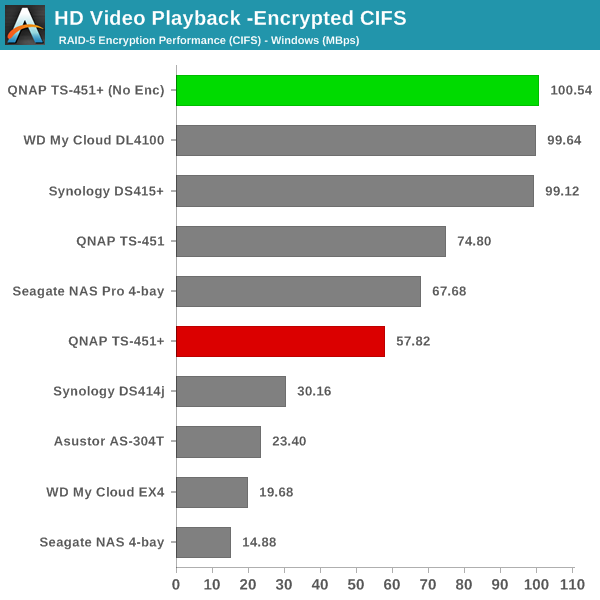
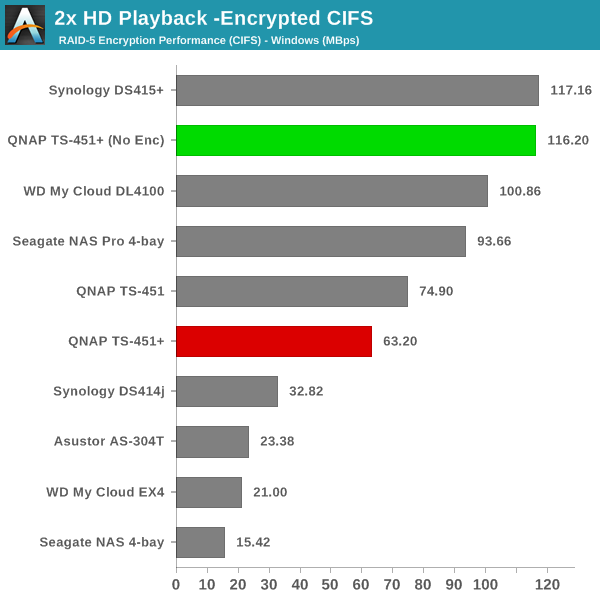
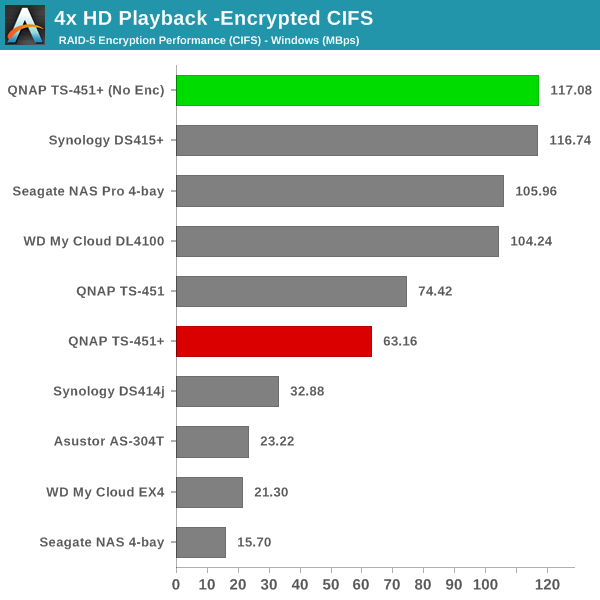
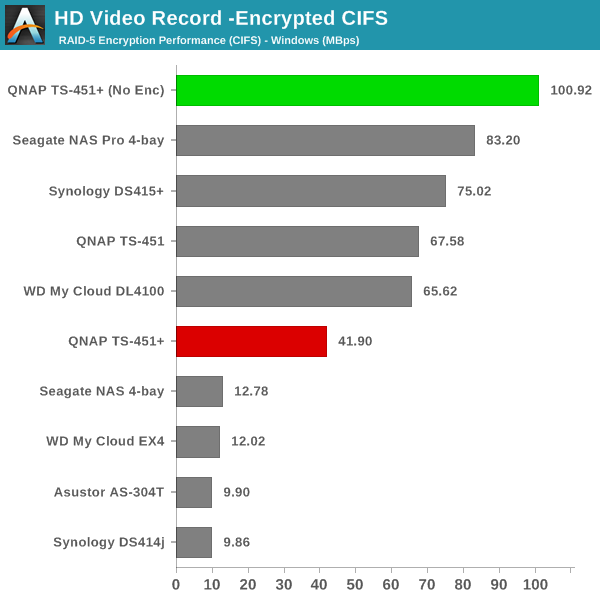
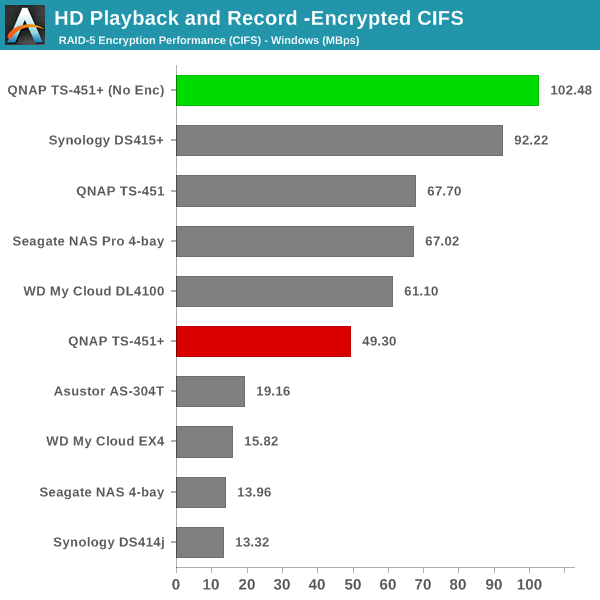
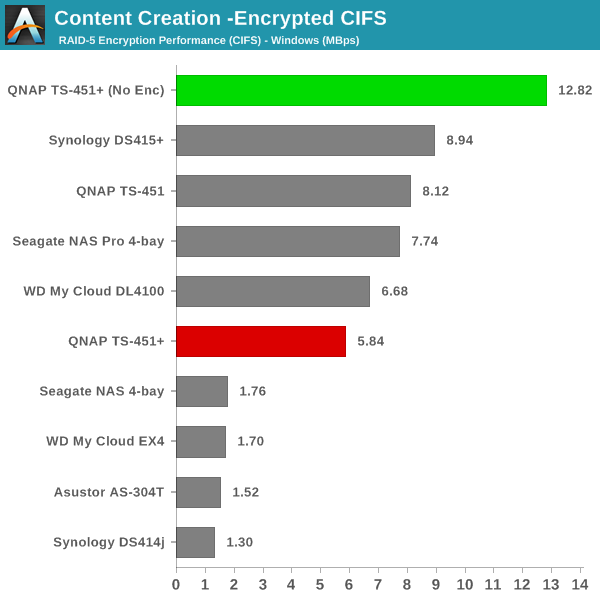
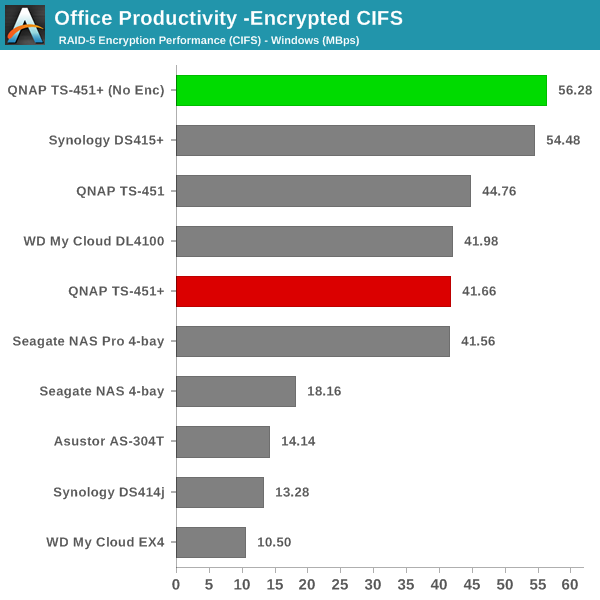
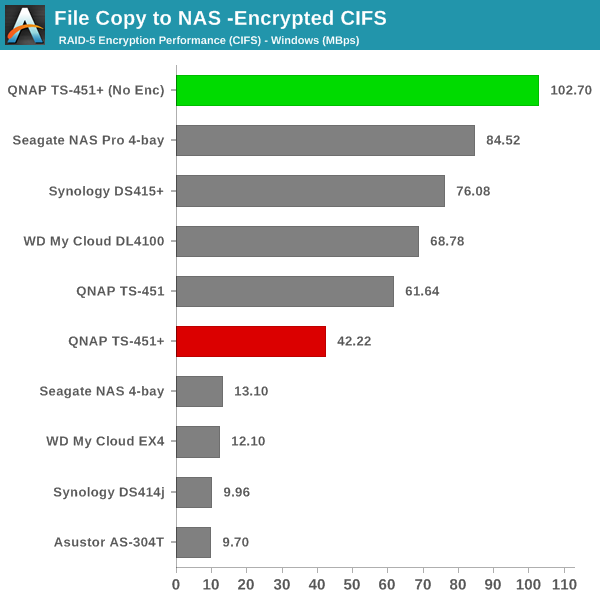
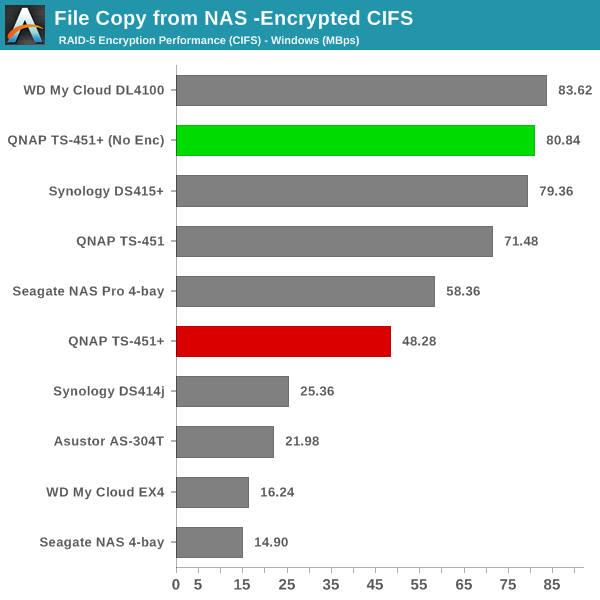
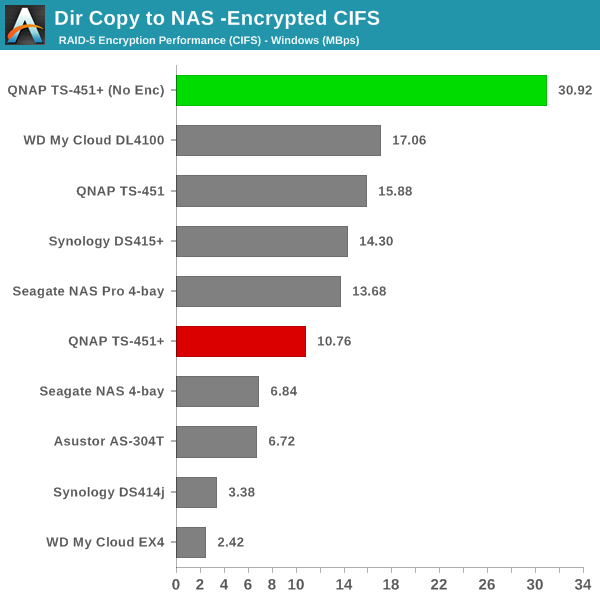
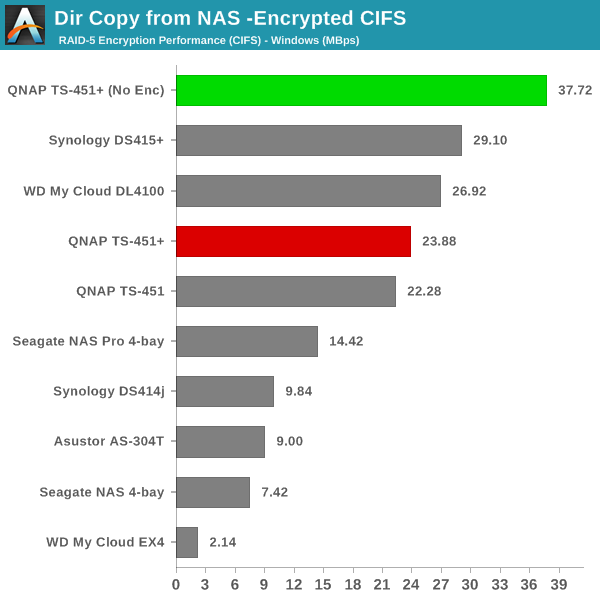
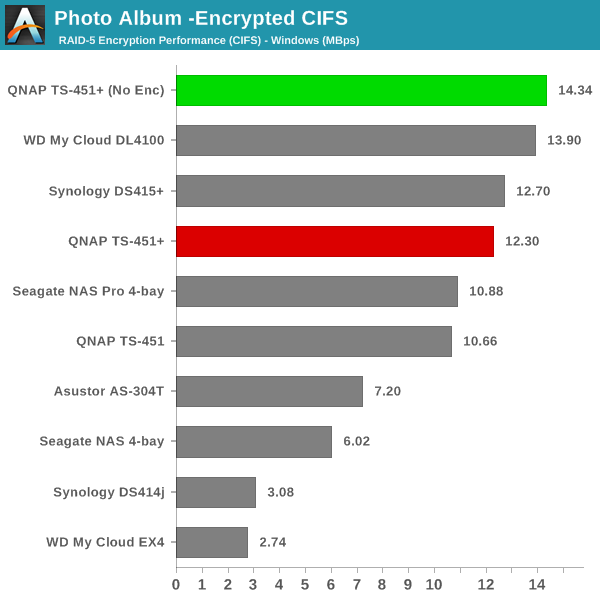
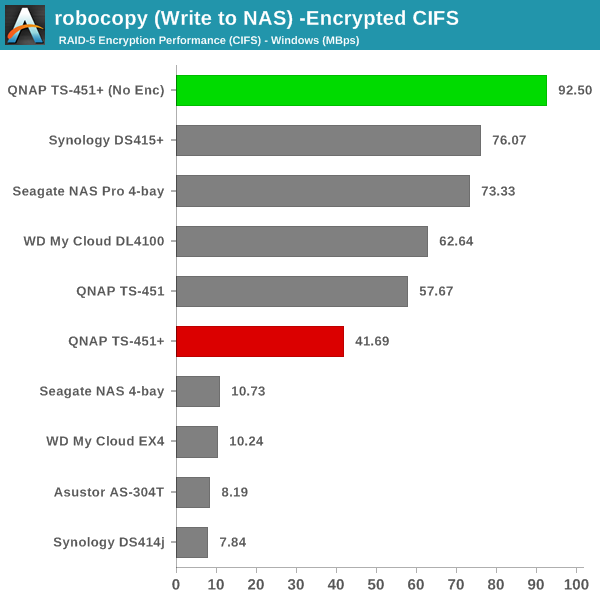
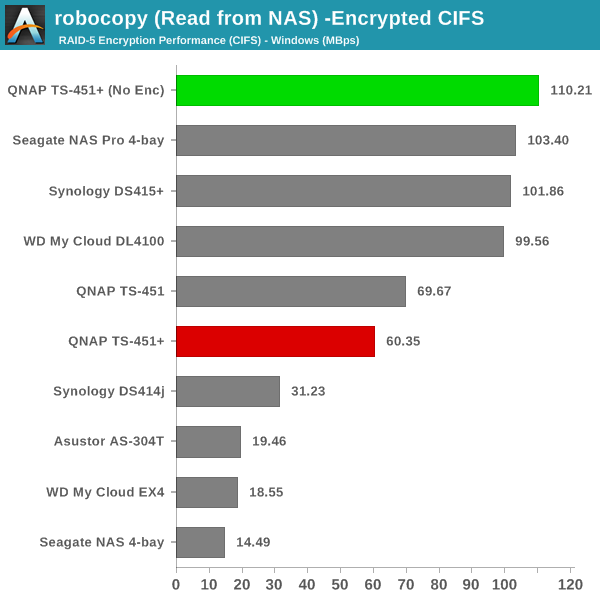
Performance loss is around the 50% range. Writes, in particular, take a heavy hit with encryption enabled. The quad-core CPU helps a bit in taking up the cryptographic load, but our advice would be for users to not take advantage of the encryption capabilities of the TS-451+ unless performance is not a concern.










34 Comments
View All Comments
BedfordTim - Friday, February 19, 2016 - link
If you look at Amazon reviews you will find that there is no customer support for a NAS either. At least with off the shelf parts if your power brick fails you can just buy another one. If your proprietary Netgear power brick fails you are facing hours on a premium rate phone line as they don't respond to web requests.kmmatney - Sunday, November 1, 2015 - link
I never got over the pricing either, and went the WHS route. I started out with a machine built with spare parts 6 years ago, and added hard drives to the system as I went, and now have 9 drives in it. I use Stablebit drivepool for drive pooling and redundancy, which I like better than using RAID. It started out with a Sempron processor which was fine in the beginning, but upgraded to a core i5 Devil's Canyon so I could run several minecraft servers. Too bad they stopped support for WHS. I'll probably just move to Windows 10 in the future.bsd228 - Friday, November 6, 2015 - link
That's a list price. The predecessor (the 451 non plus - essentially the same but with a 2.4ghz dual core instead of this 2ghz quad core) sells in the 300 (great sale) to 450 range. Amazon already lists the 451+ at 529 for the 2gig memory model.If size doesn't matter, and you're up to the task on the software side, then yeah, you can make something better for the same money. Or do it slightly cheaper. And I've done that many times with HP Microservers, and might again with a Fractal Design 304 case. But if it's not your expertise or your time is better spent elsewhere, these turnkey solutions are great. Qnap and Synology have a lot of applets, and now even the ability to run a VM for additional wants.
Oscarcharliezulu - Friday, October 30, 2015 - link
Article mentions raid rebuild is fast but if I'm reading it right rebuilds take 8 hours plus! Why do they (all) take so long? QNAP needs to support btrfs or ZfS so we can have a file system that properly protects against file corruption not just disk failure.Sivar - Friday, October 30, 2015 - link
An important and oft-overlooked issue with most home NAS units (QNAP, Drobo, Synology) is that if your unit dies out of warranty, that's it -- these companies offer no repair option or support.This is a problem with Drobo especially because they use a proprietary file system. You can of course buy another unit, if available, and move the drives over, or buy a newer model and hope for turnkey compatibility.
With a custom home NAS, well within the capabilities (if not spare time) of most Anandtech readers, you can upgrade and repair parts easily.
DanNeely - Friday, October 30, 2015 - link
Linux based NASes - like almost everything but the Drobo - use standard Filesystems, and can be recovered by sticking the drives in a normal Linux box.BedfordTim - Friday, February 19, 2016 - link
It isn't much better if they die in warranty. All NAS makers have dire reviews for customer support. Netgear has a premium number for support and a healthy queue length (30-60 minutes this morning) to maximise revenue.Navvie - Monday, November 2, 2015 - link
What would be nice is a comparison with a roll-your-own NAS solution. For example, a HP Microserver G2020T running FreeNAS or nas4free.colonelclaw - Tuesday, November 3, 2015 - link
We've been running a QNAP box that's extremely similar to this one in our office for the last couple of years, and I have to say we're extremely happy with it. We use it as an online archive of completed projects that have already been backed up, so it doesn't get a huge amount of use, but it probably shunts a terabyte or two around every week.My one criticism is that it feels like every time I log onto the admin console via a web browser it asks to install a new firmware update, but I can put up with this (mainly by not needing to log in that often).
akdubya - Wednesday, November 4, 2015 - link
"For the TS-451+ to become a compelling choice, the pricing aspect needs to be addressed."You aren't kidding. I recently put together a comparable Braswell (N3700) system for under $250. And the Braswell SoC's feature AES NI, 4K and HEVC. Yikes! Between the anemic warranties and the severely underpowered and/or overpriced hardware I'm just not seeing the value in these proprietary SOHO NAS boxes. Is it really so hard to jam PLEX/Kodi/Samba on an Ubuntu server these days? And no need to jump through hoops to "use it like a PC" because it is a PC.